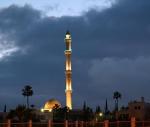You are here
Experts share ways to stay healthy while fasting
By Mays Ibrahim Mustafa - Mar 25,2023 - Last updated at Mar 25,2023

Representative image (Photo by Osama Aqarbeh)
AMMAN — To maximise the benefits of fasting during Ramadan, experts are urging people to avoid excess and follow a healthy, balanced diet.
Ramadan is the ninth month of the Islamic calendar, which is based around the lunar cycle. During this period, Muslims around the world observe a daily fast from dawn until sunset.
“Ramadan is an opportunity for people to develop healthier eating habits. It’s all about balance and moderation,” Faten Marji, a nutritionist, told The Jordan Times.
She recommended breaking one’s fast with a small meal so as not to “overburden” the digestive system after abstaining from food for an extended period of time.
“After slowly drinking a glass of water and eating one date to promote a small glycemic response, start your iftar [the fast-breaking meal at sunset] with a small bowl of soup, because it’s easy on the stomach and it’s a great way to ease the fasting body into eating,” Marji said.
She also noted that it’s advised to take a short 15-minute break before diving into the main course.
According to Marji, gradually introducing food after fasting prevents weight gain: “It’s important to eat slowly, as it can take up to 20 minutes for the brain to register that your stomach is full.”
Bushra Al Bitar, a dietitian and prenatal yoga instructor, noted that people with digestive problems in particular are advised to divide their iftar into separate meals and avoid eating a large quantity of food all at once, as that can upset the stomach.
Marji also said that it’s best to avoid fried foods, which are high in fat and calories, during iftar.
For example, sambosa, a fried pastry with a savoury filling that is traditionally eaten as an appetizer during Ramadan, is healthier when air-fried or roasted in the oven, she noted.
Moreover, Marji recommended consuming foods that are rich in protein during suhoor, the meal eaten before dawn during Ramadan, noting eggs, oats and labaneh, a Middle Eastern yogurt-like cheese, as great potential options.
“This will ensure you feel satiated for a longer period during your fast,” she said.
Nutritionist Mohammed Al Ashqar also agreed that it’s best to break one’s fast with a glass of water and one date, “a very nutritious fruit that is rich in iron and contains naturalsugars. It also helps prevent constipation and improve digestion”.
Additionally, he stressed the importance of incorporating fiber-rich vegetables in the iftar meal, as they help reduce the amount of fat around internal organs.
It’s also very important to remain hydrated after breaking one’s fast, and reduce consumption of salty foods to avoid getting too thirsty and prevent the risk of fluid retention, according to Ashqar.
He added that during suhoor, it’s preferable to consume boiled eggs and white cheeses, “which are an excellent source of slow-digesting proteins that make it easier for the body to maintain its energy and muscle mass while fasting”.
Exercise
Bitar pointed out that much of the weight lost during Ramadan is actually muscle weight, “because muscle tissue is broken down for fuel when one goes for long periods without food”.
“To increase our body’s intake of protein and avoid losing muscle mass, it’s important to consume a protein snack directly after exercising,” she told The Jordan Times.
That’s why it’s best to exercise during the last hour before iftar, or two hours after the iftar meal, she noted.
Reducing sugar consumption
Ashqar stressed the importance of eating desserts in moderation, as the excessive intake of sugar leads to insulin resistance and is linked with large fat deposits around internal organs. It can also raise blood pressure and cause cholesterol levels to increase.
According to Marji, when sugar is consumed in excess, glucose, which is stored as glycogen, can have serious health consequences such as causing build-ups in the liver and increasing the risk of diabetes.
Bitar said that consuming too much sugar leads to feelings of fatigue, decreased energy and reduced alertness.
She recommended avoiding fruit juice and sugary drinks, which are considered an “empty-calorie food” that increases the excessive consumption of calories, which in turn leads to weight gain.
Related Articles
AMMAN — In light of the start of the holy fasting month of Ramadan, health experts and nutritionists offered advice on healthy fasting habit
AMMAN — As many families start training their children to fast in Ramadan, a balanced diet containing all the nutrients is necessary to guar
AMMAN — As Ramadan begins, many look forward to a month of sugary desserts, but experts suggest modifying these traditional sweets or choosi


















